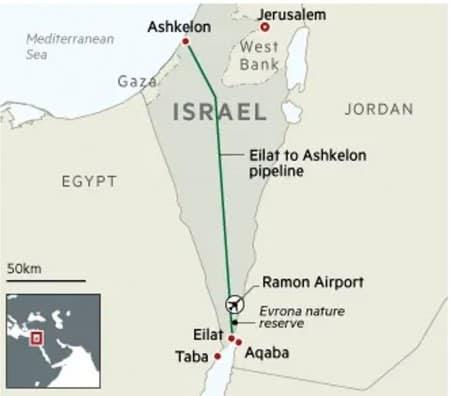US Oversees Unprecedented Preliminary Deal To Transport UAE Oil To Europe Via Southern Israel
Tyler Durden
Wed, 10/21/2020 – 18:40
It didn’t take long for the historic US-brokered peace and ‘normalization’ of ties between Israel and the United Arab Emirates to shift focus to a potential major oil pipeline project in the works.
Israel’s Haaretz newspaper reports, “In what could become one of the most significant deals to emerge since Israel and the United Arab Emirates normalized relations, the Israeli state-owned pipeline company Europe Asia Pipeline Company, or EAPC, said on Tuesday that it had signed a memorandum of understanding to store and transport oil and distillates from the UAE to Europe.”
Below is the EAPC route through southern Israel from the Red Sea to the Mediterranean port of Ashkelon. This is unprecedented considering that up until just months ago the Arab Gulf states and Israel were official enemies, as they had been for decades especially over the fate of Palestinians.
Haaretz reports further that the memorandum of understanding was signed in Abu Dhabi on Monday, in a ceremony attended by US Treasury Secretary Steve Mnuchin.
“This is a historic agreement that will increase cooperation between EAPC and regional and international players. Without a doubt, this agreement has great importance for the Israeli economy both economically and strategically, because it involves long-term joint investments,” EACP Chairman Erez Kalfon said.
The Saudi-owned media outlet based on Dubai, al-Arabiya, also confirmed the preliminary deal.
And Reuters cited an inside source who speculated it could be worth an estimated $700-$800 million in the coming years. The arrangement “is likely to increase the transferred quantities by tens of millions of tons per year,” the source said. Supplies could start being delivered via the Red Sea to Mediterranean route by early 2021.
Yesterday, the Israeli company EAPC (which operates the Eilat-Ashkelon pipeline) signed a deal with the MED-RED consortium in the presence of the US Secretary of Treasury, Steven Mnuchin pic.twitter.com/mLczXV2q9j
— Michael A. Horowitz (@michaelh992) October 21, 2020
Europe Asia Pipeline Co, which is jointly controlled by Israel’s government and UAE-based MED-RED Land Bridge plans to “deliver petroleum distillates originating in the Gulf through the EPAC pipeline and sell them to European customers,” according to Haaretz.
Specific details are being described as a tightly guarded secret, however, there’s speculation that the pipeline could eventually be extended across Saudi Arabia, also possibly as part of Washington’s desire to see normalized relations between Riyadh and Tel Aviv, which would be a monumental step.
The details of the deal are not clear, but some reports suggest the pipeline will be “extended to the UAE” (here from Times of Israel), which would mean crossing into Saudi Arabia pic.twitter.com/PkHYS5SK6k
— Michael A. Horowitz (@michaelh992) October 21, 2020
The day after the signing of Monday’s historic MOU, the first official UAE delegation flew to Tel Aviv accompanied by Treasury Secretary Steven Mnuchin.
The pipeline itself has for decades been highly secretive in terms of operations, as well as source of geopolitical conflict. The pipeline’s history is fascinating considering it started as a joint Israeli-Iranian venture, as unlikely as that sounds. As Bloomberg summarizes, it reaches back to the years of the US-backed Shah in Iran:
The Eilat Ashkelon Pipeline Co., as EAPC used to be called, was jointly owned by the Jewish state and Iran’s government. Tehran would ship some of its Europe-bound oil to Eilat and then pipe it to Ashkelon on the Mediterranean.
After Iran’s Islamic Revolution in 1979, the nations became enemies. Yet for some years Israel still allowed Iranian oil to be sent through the pipeline in secret, including by Glencore Plc founder and sanctions-busting commodities trader Marc Rich.
Amazingly, it’s still unknown just what the pipeline has transported and sourcing in terms of operations over the past years. “The two countries have argued over the pipeline more recently, with Tehran wanting compensation after Israel took over its 50% stake. “Even today, information on what flows through the pipeline can be censored by Israel’s military,” continues Bloomberg.
It’s already being reported that a $3 billion Jerusalem-based fund which has US government involvement is getting behind the Israeli-UAE project.
It appears that for all the media hype surrounding the historic opening up of diplomatic relations between Arab Gulf states and Israel, at the end of the day it all comes back to oil, as has long been the story in the Middle East.
via ZeroHedge News https://ift.tt/3kkVlXx Tyler Durden
